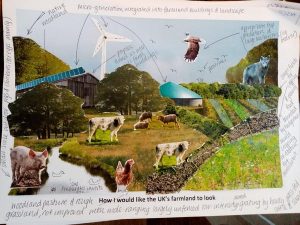“How a farm might generate an income in the future, and the ethics of scaling back on a farm’s food-producing capacity in order to better serve nature.”
.
Who was more the romantic of the good life: Emerson or Thoreau?
“What is a farm,” Emerson had asked, “but a mute gospel?” But Thoreau saw that farms burdened and restricted people who took them up, by yoking them to constant anxiety and repetitive labor: “Why should they eat their sixty acres, when man is condemned to eat only his peck of dirt? Why should they begin digging their graves as soon as they are born?”
The Thoreau Poison | The New Yorker
.
On a more prosaic level, in a report from the Land, Environment, Economics and Policy Institute (LEEP), University of Exeter, the question is asked: Is there a future for the small family farm in the UK? And to set the scene, a further question is asked:
What is a Farm?
Whilst this might seem self-evident and obvious, it is when we come to consider what exactly comprises a farming operation that some of the challenges become clearer. In economic terms, a farm is a collection of resources, usually based around the land and biological processes, configured as a result of decisions made by people (farmers) having particular objectives in view. At any given time, the resources available are in part historically determined (land area, existing buildings), and in part the result of decisions made by the current farmer.
At any scale of activity, viability depends on the capacity to produce a flow of monetised benefits from resources transformed into products. Moreover, those benefits must be sufficient to pay for current resource use, personal drawings of the farm household, make provision for replacement of depreciated assets, make new investments, repay debts and meet interest payments. The extent to which a farm succeeds in these terms will depend on the volume and value of the outputs as determined by market prices and support payments. The main objective of any farmer must be to cover financial expenditures on inputs (financial costs) out of the financial returns earned from using those inputs for production. Without satisfying that objective, viability is unsustainable except in the very short term.
Is there a future for the small family farm in the UK? | princescountrysidefund.org.uk
.
For a farm to be ‘financially sustainable’, the UK government has suggested diversifying:
.
 With Brexit, there was the promise of more help to farmers to make their farms both more financially sustainable and ecologically so.
With Brexit, there was the promise of more help to farmers to make their farms both more financially sustainable and ecologically so.
Here’s a study asking the British public to define ‘What is a farm’ for tomorrow, with a visual representation from the focus groups, plus the conclusion to the report in the Conversation:
The UK government clearly has its work cut out devising policies that produce food in an environmentally friendly way at prices cheap enough to ensure retailers don’t source food from abroad and effectively offshore the environmental consequences. While it’s certain there will be winners and losers from Brexit, let’s hope the environment and the UK’s food security don’t fall into the latter category.
How should the British countryside look post-Brexit? We asked the public
What does the UK public want farmland to look like? – ScienceDirect
.
The new regime might help wildlife on the farm – although the Greener UK group is not so sure:
The groups agree there are positives developments – especially the scrapping of the EU’s controversial Common Agricultural Policy (CAP), which used to pay farmers grants depending on how much land they farm. The report says the UK’s own new farm subsidy regime offers a good opportunity to restore wildlife…
Green Brexit didn’t happen, says environmental coalition – BBC News
.
To take an example, on a farm in Pembrokeshire:
On this morning’s On Your Farm on Radio 4, Verity Sharp asked the fundamental question of ‘What is a farm?’ – whether it is about managing the land or about producing food or about making a living:
The Good Life?
Having suppressed her inner farmer for as long as she can remember, in November 2020, Verity Sharp and her family took the decision to rent a farmhouse in north Pembrokeshire to explore whether a farming life is really for them. Although an incredible opportunity, testing the water during a Welsh winter and a national lockdown has had its challenges.
At 77 acres, the farm is owned by former sheep farmers Val and Eddie Kirby, who, in more recent years, have been reducing their livestock and handing the land back to nature. Wildflowers now flourish in every field, marshland supports an abundance of insects, and increased hedgerows and trees are proving a draw for birds. For this edition, Verity and Patrick look back over their first six months on the farm, and wrestle with issues such as whether going into farming in their fifties for the first time is really a good idea, how a farm like this might generate an income in the future, and the ethics of scaling back on a farm’s food producing capacity in order to better serve nature.
BBC Radio 4 – On Your Farm, The Good Life?
.
illustration: “Wind turbines compete for space with cows, wildflower meadows and birds of prey. Niki Rust, Author provided”
How should the British countryside look post-Brexit? We asked the public
What does the UK public want farmland to look like? – ScienceDirect